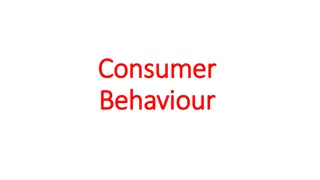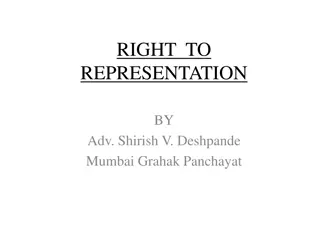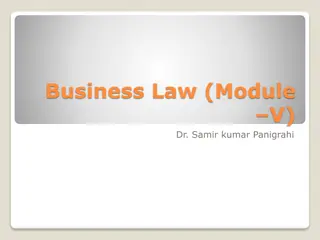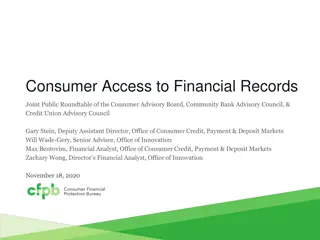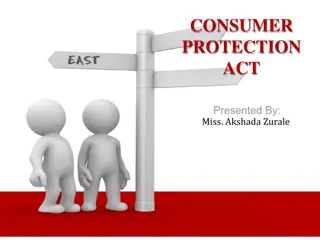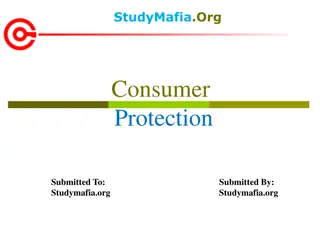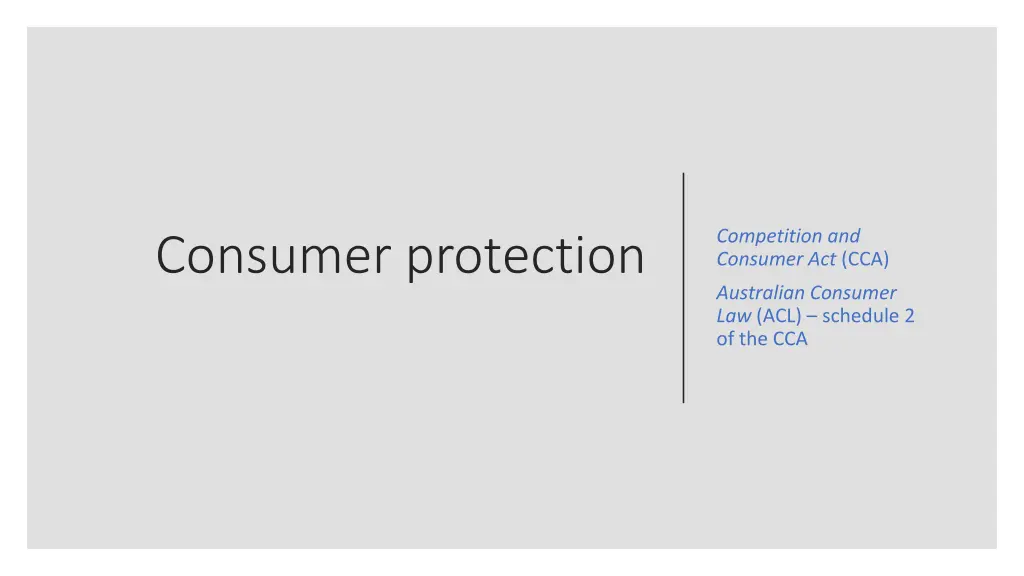
Consumer Protection and Legislative Framework Evolution
Discover the evolution of consumer protection laws, from the historical concept of caveat emptor to modern legislation like the Competition and Consumer Act (CCA). Explore the shift towards balancing freedom of contract with terms implied by law and the rise of multinational companies impacting consumer rights. Learn about the rationale for legislative protection and the role of laws like the Australian Consumer Law (ACL) in safeguarding consumers against misleading conduct and defective products.
Download Presentation

Please find below an Image/Link to download the presentation.
The content on the website is provided AS IS for your information and personal use only. It may not be sold, licensed, or shared on other websites without obtaining consent from the author. If you encounter any issues during the download, it is possible that the publisher has removed the file from their server.
You are allowed to download the files provided on this website for personal or commercial use, subject to the condition that they are used lawfully. All files are the property of their respective owners.
The content on the website is provided AS IS for your information and personal use only. It may not be sold, licensed, or shared on other websites without obtaining consent from the author.
E N D
Presentation Transcript
Competition and Consumer Act (CCA) Consumer protection Australian Consumer Law (ACL) schedule 2 of the CCA
Freedom of contract vs terms implied by law: balancing trading grounds major shifts in consumer protection law frameworks were introduced from the mid 1900s on historically marketplaces & deal making to acquire goods involved - for the most part genuine mutual negotiations capacity to inspect/validate goods reasonably easily (caveat emptor) let the buyer beware + (laissez faire) free market economic principles = relatively limited legal intervention beyond fraud/misrepresentation principles Why did Jack get a restraining order? Beanstalking.
rise of multi-national companies: grossly disproportionate financial resources/information vs average consumers proliferation of non negotiable standard form contracts ( contracts of adhesion , boiler plate contracts ) technologically sophisticated products (non assessable on their face or even within relatively short time frames) markedly different purchasing and delivery processes (greater) complexity and costs in seeking redress with merchants So what changed? FTA/ SOGA Vic, Tas, etc Fair Trading Act (Vic) Fair Trading Act/Sale of Goods Act (Qld) Competition & Consumer Law Act (Cth) 2010 Trade Practices Act (Cth) 1974 - s. 52 Uniform Commercial Code 1955 (USA) Fair Trading Act, UK 1896
Rationale for Legislative Protection: Caveat Emptor: let the buyer beware Examples Misrepresentation Unconscionable conduct what consumer problems do you see arising? Defective Products Consumer Refunds "That principle [caveat emptor] may have been appropriate for transactions conducted in village markets. It has ceased to be appropriate as a general rule. ... Anti competitive acts monopolies, price fixing, predatory pricing, etc. The untrained consumer is no match for the businessman ... The consumer needs protection by the law and this Bill will provide such protection." (Commonwealth, Parliamentary Debates, Senate, 30 July 1974, 540 1 (Lionel Murphy, Attorney-General)). Other? (door to door sales, pyramid schemes ) http://www.accc.gov.au/content/index.phtml/itemId/935751
The Big Dog: misleading & deceptive conduct s. 18 ACL Misleading or deceptive conduct (1) A person must not, in trade or commerce, engage in conduct that is misleading or deceptive or is likely to mislead or deceive. picks up common law simplifies case lines for misrepresentation and mistake removes intent (strict liability) no need to prove fraud/reckless disregard of truth/innocent misrep s.18 = a catch-all section used across wide ranging types of legal actions and emerging ones: employment contracts & relations competitor initiated suits for false or misleading advertising (rare but growing) unsuccessful tenderers Note: a corporation in breach of another CCA section may also be in breach of this provision. frequently s 18 claims run with estoppel claims (why?)
Consumer protection implied quality standards Competition and Consumer Act guarantees = dual approach to enhancing consumer outcomes: Integrity of the product / Integrity of the transaction Implied Terms CCA guarantees . Of Acceptable Quality Match their Description Correspond with sample Title Fit for their particular purpose Quiet Possession Right to sell the goods Free from encumbrances (eg., deliver good title) (eg., securities, liens, etc.) View: The Checkout with Julian Morrow: https://www.youtube.com/watch?v=Sp1XiaLUmP0
CCA, ACL guarantees : Australian Consumer Law So who is a consumer ? General definition of consumer S 3 ACL - a presumption that a person is a consumer if they acquire goods or services for $40,000 or less, or of a kind ordinarily acquired for personal, domestic or household use or consumption, or a vehicle or trailer (at any price) for use principally in the transport of goods on public roads And do not acquire, or hold themselves out as acquiring, the goods for purpose of resupply, using them up or transforming them, in trade or commerce, in the course of a process of production or manufacture, or repairing or treating other goods or fixtures on land
Replacement, Refunds Rights & limits: major vs minor defect If a MAJOR problem exists, the consumer may elect a If MINOR, however, the sellerhas the right to elect repair replacement replacement or refund or repair Replacement = identical (or equivalent to) product originally supplied. Refund = same amount as paid + in the same form as original payment. seller may take into account how much time has passed since the purchase as judged against factors including: type of product how a consumer is likely to use the product the length of time for which it is reasonable for the product to be used the amount of use it could reasonably be expected to tolerate before the failure becomes noticeable. For a major problem with services a purchaser can cancel the contract and obtain a refund or seek compensation for the drop in value of the services provided compared to the price paid.
What is a major problem? Major problem for a product or good = issue that: would have stopped someone from buying it if they d known about it makes it significantly different from the sample or description renders it substantially unfit for its common purpose and can t easily be fixed within a reasonable time doesn t do what was asked for and can t easily be fixed within a reasonable time is unsafe. Major problem for a service = would have stopped someone from buying it if they d known about it renders it substantially unfit for its common purpose and can t easily be fixed within a reasonable time does not meet the specific purpose asked for and cannot easily be fixed within a reasonable time creates an unsafe situation.
Exceptions to rights re: guarantees Rights do not apply to goods re: Consumer guarantees do not apply for: change of mind, cheaper prices, change of preference/use repair, replacement, refund, cancellation or compensation If $40 000+ purely for business use, e.g., machinery or farming equipment misuse of the product in any way that caused the problem use in the context of on-selling or re-supply as a business knowledge of or otherwise made aware of the relevant faults prior to purchase bought as a one-off from a private seller, e.g., a garage sale or fete (but you do have rights to full title, undisturbed possession and no unknown debts or extra charges) In pre-purchase negotiations, requests for a service to be done in a certain way against the advice of the business or if discussions around that outcome/use were unclear about what was wanted/required bought at auction where the auctioneer acted as an agent for the owner (same as above)
Fit for Purpose 54(2)a SUMMARY consumer guarantees goods: Acceptable quality? Goods = acceptable quality How would the Act treat the following? fit for a particular purpose discussed -2nd hand goods? - defective or samples? - goods used for an unusual purpose? Goods = acceptable quality if they are: match their description safe, durable, free from defects match the sample or demonstration model acceptable in appearance and finish Additionally: able to do everything that they are commonly used for. A consumer purchases a new pair of shoes, one of which loses a heel when it is worn for the first time? all express warranties will be honoured Supported by available spare parts & repair facilities for a reasonable time Goods will also give the buyer: How is this judged? the nature of the goods the price information provided directly by the seller or the manufacturer, or on packaging or promotional material clear title undisturbed possession no undisclosed securities on the goods
Fit for Purpose Other guarantees? Guarantee - title: no one will try to repossess or reclaim a product you buy. hired or leased goods: Guarantees: applies only to the period of the hire or lease: if the goods are purchased under a payment plan and the agreed payment isn t made, the seller may be able to repossess the goods. - rsble stock on hand to meet expected consumption - repair materials for rsble time A consumer purchases a new television that requires repair after six months. The supplier cannot provide spare parts to repair the television ..? A consumer buys a second-hand car from a private seller. The car is then repossessed by the police because it was stolen. At common law, issues existed with loss burden allocation (and privity). This tidies up that traditional problem.
Unfair contracting provisions: CCA - for consumers involved in standard form contracts NEW Statute still evolving Terms excluded from coverage include those that: Unfair Contracts Terms means courts: define the main subject matter of the contract may takeinto account such matters as it thinks relevant Set the upfront price payable under the contract must take into account the extent to which the term is transparent Are required, or expressly permitted, by a law of the Commonwealth, a State or a Territory Constitute financial products or contracts for the supply or possible supply of services that are financial services as equivalent unfair terms in these contracts are covered by the Australian Securities and Investment Commission Act (2001) Cth (s.15) When considering the contract as a whole
Unfair contracting provisions: CCA - for consumers involved in standard form contracts Harsh or oppressive exploitation of a weaker party by a stronger party that goes beyond normal hard commercial or professional dealings and offends good conscience. (s. 20, Pt 2-2 CCA) Who is impacted? Consumer transactions Commercial and professional dealings between businesses (e.g., harsh or oppressive business conduct from suppliers, business customers, franchisors or landlords) Not all unfair conduct is necessarily unconscionable conduct nor unlawful under the Act.. Only businesses/professionals: - acting in bad faith, - employing unfair tactics or - attempting unreasonably to extract benefits through use of size/bargaining power.



